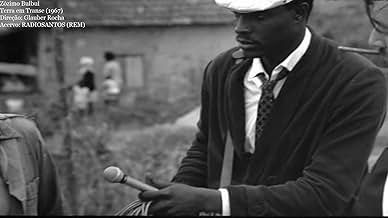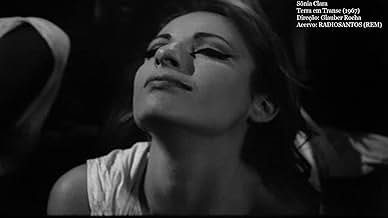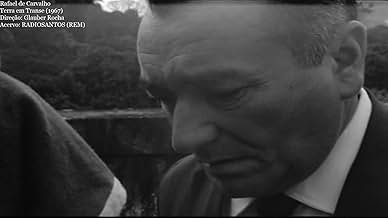IMDb RATING
7.3/10
3.8K
YOUR RATING
In the fictional Latin American country Eldorado, a poet tries to effect political change by influencing powerful men.In the fictional Latin American country Eldorado, a poet tries to effect political change by influencing powerful men.In the fictional Latin American country Eldorado, a poet tries to effect political change by influencing powerful men.
- Awards
- 2 wins & 1 nomination total
Jofre Soares
- Father Gil
- (as Joffre Soares)
Thelma Reston
- Felício's wife
- (as Telma Reston)
Emmanuel Cavalcanti
- Felício
- (as Emanuel Cavalcanti)
- Director
- Writer
- All cast & crew
- Production, box office & more at IMDbPro
Featured reviews
Glauber Rocha is crazy, and here he explores his favorite subject - politics. Rocha shows, I think, that the line between poetry and politics can be blurred, and that they can and is being aproached the same way, in a sense that both dont have a definitive solution and people form different kind of theories. Glauber brilliantly potrays this paradox, and the film is a answer to the great mystery. Its a political essay as well as a cinematic masterpiece. Its poetry and psychedelic merged in to a transic account, following the same logic as in a dream. Godlike.
In the film, Glauber will prepare an analysis, seeking to reflect on the reasons that led to the 'Collapse of Populism in Brazil' in 1964. "Terra em Transe" criticizes social classes and uses 'Theory of Populism' to explain the reasons for the victory of the Coup. Rocha suggests that, the Military Dictatorship installment in Brazil after the Coup of 64', he did not believe that armed struggle would be the best way to defeat the it, because the dictatorship was becoming increasingly repressive and increasingly closed all channels of popular participation in the country's political life. So, what is the way out that Glauber points out to get Brazil out of that situation? In fact, he doesn't know and, precisely because of that, he doesn't point out any solution, he just tries to portray the complex situation with an extraordinary poetic approach.
Brazil was in a situation of impasse and that there was no solution for it at that time. It shows the vision of a political and social situation in Brazil at that historical moment, which was based on the knowledge of some aspects in the Brazilian reality at that time, as well as making it clear how the country came to this situation and what were the main dilemmas and impasses facing the Brazilian nation.
I have decides to add some qoutes at the end of my review to confirm this political thesis of the films intention:
Porfirio Diaz becomes Dictator of Eldorado and says "They will learn! They will learn! I will rule this land. I will put these hysterical traditions in order! By force, for the love of force! By the universal harmony of hells, we will reach a civilization!" Such speech well sums up the reactionary and fascist thinking of a large part of the country's ruling classes and is still very current.
Desperate with the Coup victory, Paulo insists on promoting an armed resistance, but that will be useless, as the Coup has already been victorious. He wonders how long we will endure all this suffering. Sara asks 'What proves her death' and Paul replies 'The triumph of beauty and justice'.
In the film, Glauber will prepare an analysis, seeking to reflect on the reasons that led to the 'Collapse of Populism in Brazil' in 1964. "Terra em Transe" criticizes social classes and uses 'Theory of Populism' to explain the reasons for the victory of the Coup. Rocha suggests that, the Military Dictatorship installment in Brazil after the Coup of 64', he did not believe that armed struggle would be the best way to defeat the it, because the dictatorship was becoming increasingly repressive and increasingly closed all channels of popular participation in the country's political life. So, what is the way out that Glauber points out to get Brazil out of that situation? In fact, he doesn't know and, precisely because of that, he doesn't point out any solution, he just tries to portray the complex situation with an extraordinary poetic approach.
Brazil was in a situation of impasse and that there was no solution for it at that time. It shows the vision of a political and social situation in Brazil at that historical moment, which was based on the knowledge of some aspects in the Brazilian reality at that time, as well as making it clear how the country came to this situation and what were the main dilemmas and impasses facing the Brazilian nation.
I have decides to add some qoutes at the end of my review to confirm this political thesis of the films intention:
Porfirio Diaz becomes Dictator of Eldorado and says "They will learn! They will learn! I will rule this land. I will put these hysterical traditions in order! By force, for the love of force! By the universal harmony of hells, we will reach a civilization!" Such speech well sums up the reactionary and fascist thinking of a large part of the country's ruling classes and is still very current.
Desperate with the Coup victory, Paulo insists on promoting an armed resistance, but that will be useless, as the Coup has already been victorious. He wonders how long we will endure all this suffering. Sara asks 'What proves her death' and Paul replies 'The triumph of beauty and justice'.
While watching this, I kept on going back and forth between a 4 and a 4.5 before I finally settled on a 4.5. Like Rocha's "Black God, White Devil", which I watched a year or two ago, I didn't quite follow everything which went on and somewhat struggled to keep up with the plot. The more of this I watched, however, the more impressed I was with various stylistic touches such as the narration taking on a ghostly feel (the camerawork helps in that regard), various scenes appearing to occur in between Paulo's head and reality, and the film maintaining a dream-like atmosphere at numerous points. The film also captures the blindness of the masses towards accepting the false promises of political figures, and how this blind faith is a pattern which repeats itself over and over again. Thematically, it's interesting, but stylistically, it hits a number of my sweet spots really well and I definitely intend on rewatching it later this year to see if my appreciation of it goes up or down.
I know that most people will consider this opinion as heretics, but I think this a bad movie. Despite the good cinematography and the many great actors. The script is an undevelopped and confusing mess, partially in a hurry, partially simply shallow, exceding in its chaotic expressionist improvisation. It is pretensious but lacks deepness and a more sophisticated social political critique. Dialogs are just bad. Technically, sound is also quite flawed. Edition is unjustifiably harsh sometimes, with abrupt cuts. Many scenes are partially documental, as they were shot with few actors and many extras who were indeed common people who ignored that the situation was fictious (it may work but is moral questionable). The only really good part is the small segment in which there is a kind of mockumentary about Porfirio Diaz. To resume, "Enhanced earth" is world-wide celebrated but seriously overrated.
Another movie watched, or rather, reviewed, for the course on Cinema Novo that I'm doing in Cinema com Teoria, taught by Prof. Alisson Gutenberg.
Terra em Transe is part of the second phase of Cinema Novo. Directed by Glauber Rocha, it has an exquisite cast, all in fantastic performances: Jardel Filho (Paulo Martins), Paulo Autran (Porfírio Diaz), José Lewgoy (Felipe Vieira), Glauce Rocha (Sara), Paulo Gracindo (Don Julio Fuentes), Hugo Carvana (Álvaro), Joffre Soares (Father Gil), Danuza Leão (Sílvia), Mário Lago (Captain), Flávio Migliaccio (man of the people), Francisco Milani (Aldo).
To circumvent the censorship, which was still not as incisive as after the AI-5, Rocha set the plot in Eldorado, a fictional country located in Latin America. Porfírio Diaz, not by chance is the name of the Mexican dictator who has been in power for more than three decades, with a campaign theme that unites Catholic religion and conservatism, will run for reelection as president of Eldorado with Felipe Vieira, a populist politician. Paulo Martins is a poet who advised Porfírio, but changes sides when he realizes that he distances himself from popular agendas. Sara is his wife and balance point. It is in this political context that the story unfolds.
Glauber uses a lot of allegory to develop a plot that was a mirror of the situation experienced by Brazil, a few years after the 1964 military coup. As an allegory, it will explore situations reminiscent of a samba school parade: dancers and drums at a Felipe Vieira rally, luxurious costumes that portray the past of Eldorado, with the arrival of the white man on the country's coast (here there is a luxurious participation of Clóvis Bornay, icon of the costume parades in Rio de Janeiro), a lot of percussion in the soundtrack, in contrast with classical music, which makes a good distinction between the popular and the erudite, the flag bearer (in this case, Glauber subverts the order and puts a man, Porfírio, to carry a black flag - a sign of mourning for the situation in Brazil?, another allegory) and the parade itself with the walks of candidate Fellipe with the people.
The film also directly brings strong messages such as the scene in which Jerônimo, a representative of the people, starts to speak to Felipe, but is interrupted with Paulo Martins' hand in his mouth, saying that the people have no voice. The violence against those who demonstrated is also shown, and the most violent period of the Brazilian dictatorship had not even begun, in the scene in which the character of Flávio Migliaccio, purposely unnamed, is punched by the candidate's security (Maurício do Valle).
Another interesting contrast is between Carnival, as already exposed here, and Opera, once linked to the poorest strata of the population, to later become synonymous with the elite. The scene in which Porphyry falls with his flag on the steps of a palace is a true act of an opera.
The dialogues and monologues, especially those of Paulo Martins, are difficult to understand, with much erudition. And then Glauber didn't understand why his films didn't have an audience... Reviewing the film, I realized its relevance, especially regarding the political context in which Brazil plunged with the result of the 2018 election.
Despite all these considerations above, which I think are very appropriate, I don't like the film, much for its audio. The noise is annoying all the time, with overlapping voices, soundtrack and ambient sound, at a volume above normal. It is often difficult to understand what the actors are saying, and understanding the dialogues requires reflection at all times. For me, it was a lot of allegory inserted in the political context, which came to be caricatured. Anyway, I recognize the importance of the film for the history of Brazilian and Latin American cinema.
Terra em Transe is part of the second phase of Cinema Novo. Directed by Glauber Rocha, it has an exquisite cast, all in fantastic performances: Jardel Filho (Paulo Martins), Paulo Autran (Porfírio Diaz), José Lewgoy (Felipe Vieira), Glauce Rocha (Sara), Paulo Gracindo (Don Julio Fuentes), Hugo Carvana (Álvaro), Joffre Soares (Father Gil), Danuza Leão (Sílvia), Mário Lago (Captain), Flávio Migliaccio (man of the people), Francisco Milani (Aldo).
To circumvent the censorship, which was still not as incisive as after the AI-5, Rocha set the plot in Eldorado, a fictional country located in Latin America. Porfírio Diaz, not by chance is the name of the Mexican dictator who has been in power for more than three decades, with a campaign theme that unites Catholic religion and conservatism, will run for reelection as president of Eldorado with Felipe Vieira, a populist politician. Paulo Martins is a poet who advised Porfírio, but changes sides when he realizes that he distances himself from popular agendas. Sara is his wife and balance point. It is in this political context that the story unfolds.
Glauber uses a lot of allegory to develop a plot that was a mirror of the situation experienced by Brazil, a few years after the 1964 military coup. As an allegory, it will explore situations reminiscent of a samba school parade: dancers and drums at a Felipe Vieira rally, luxurious costumes that portray the past of Eldorado, with the arrival of the white man on the country's coast (here there is a luxurious participation of Clóvis Bornay, icon of the costume parades in Rio de Janeiro), a lot of percussion in the soundtrack, in contrast with classical music, which makes a good distinction between the popular and the erudite, the flag bearer (in this case, Glauber subverts the order and puts a man, Porfírio, to carry a black flag - a sign of mourning for the situation in Brazil?, another allegory) and the parade itself with the walks of candidate Fellipe with the people.
The film also directly brings strong messages such as the scene in which Jerônimo, a representative of the people, starts to speak to Felipe, but is interrupted with Paulo Martins' hand in his mouth, saying that the people have no voice. The violence against those who demonstrated is also shown, and the most violent period of the Brazilian dictatorship had not even begun, in the scene in which the character of Flávio Migliaccio, purposely unnamed, is punched by the candidate's security (Maurício do Valle).
Another interesting contrast is between Carnival, as already exposed here, and Opera, once linked to the poorest strata of the population, to later become synonymous with the elite. The scene in which Porphyry falls with his flag on the steps of a palace is a true act of an opera.
The dialogues and monologues, especially those of Paulo Martins, are difficult to understand, with much erudition. And then Glauber didn't understand why his films didn't have an audience... Reviewing the film, I realized its relevance, especially regarding the political context in which Brazil plunged with the result of the 2018 election.
Despite all these considerations above, which I think are very appropriate, I don't like the film, much for its audio. The noise is annoying all the time, with overlapping voices, soundtrack and ambient sound, at a volume above normal. It is often difficult to understand what the actors are saying, and understanding the dialogues requires reflection at all times. For me, it was a lot of allegory inserted in the political context, which came to be caricatured. Anyway, I recognize the importance of the film for the history of Brazilian and Latin American cinema.
Released on Mr Bongo in 2005 "Terra em Transe" is dated, and has a confused screenplay, although being magnificently updated regarding the lack of ethics and the amoral behavior of the politicians. If the reader has had the opportunity of reading Machiavelli's "The Prince", you'll probably see how the behavior of politicians remains unchanged along the centuries.
However, keeping in mind that in this is movie Brazil was under a tough military dictatorship, this movie is a milestone in the history of Brazilian New Cinema. Glauber Rocha was very braze, discussing forbidden themes such as fight of classes, manipulation of the submissive masses by the elites, corruption in politician, anarchism, campaign promises not kept after the elections, economical power of foreign groups (or countries) in Latin American countries and coup d'état. In 1967, "Terra em Transe" was awarded with "Great Prize" in the Locarno Festival (Switzerland); "Luis Buñuel Prize" in Cannes Festival; "Federation of International Critics Prize" in Cannes Festival; and Best Movie of the Year in the Air France Prize, among other prizes
However, keeping in mind that in this is movie Brazil was under a tough military dictatorship, this movie is a milestone in the history of Brazilian New Cinema. Glauber Rocha was very braze, discussing forbidden themes such as fight of classes, manipulation of the submissive masses by the elites, corruption in politician, anarchism, campaign promises not kept after the elections, economical power of foreign groups (or countries) in Latin American countries and coup d'état. In 1967, "Terra em Transe" was awarded with "Great Prize" in the Locarno Festival (Switzerland); "Luis Buñuel Prize" in Cannes Festival; "Federation of International Critics Prize" in Cannes Festival; and Best Movie of the Year in the Air France Prize, among other prizes
Did you know
- TriviaEldorado is a fictional country. It's entirely based on political and social issues of Brazil after 1964 while the country was under a military dictatorship that was over only in 1985.
- Quotes
Felipe Vieira: The streets belong to the people, like the sky belongs to the condors.
- ConnectionsFeatured in Improvisiert und zielbewusst (1967)
- SoundtracksOtello: Overture
Music by Giuseppe Verdi
- How long is Entranced Earth?Powered by Alexa
Details
- Runtime1 hour 48 minutes
- Color
- Sound mix
- Aspect ratio
- 1.66 : 1
Contribute to this page
Suggest an edit or add missing content






























